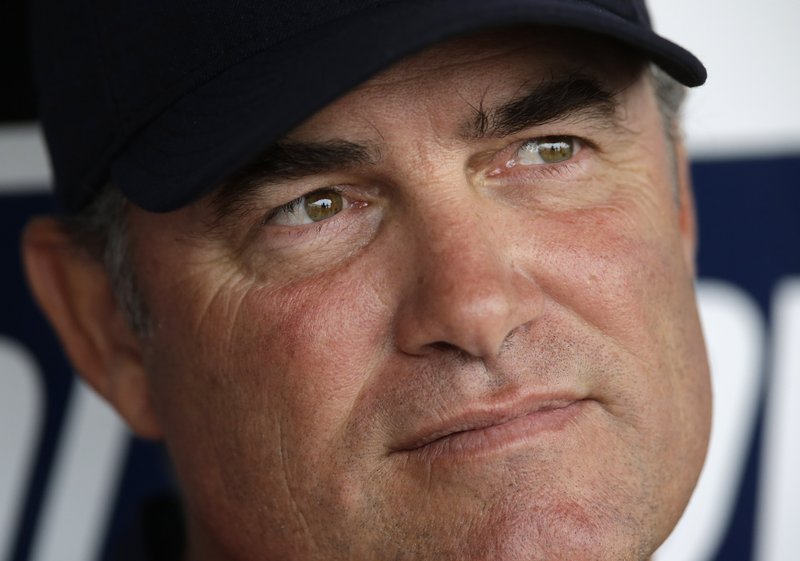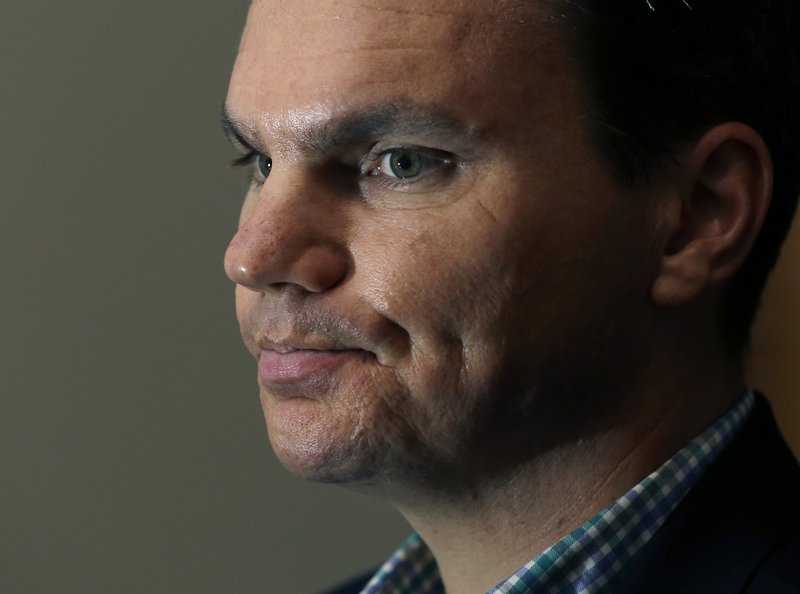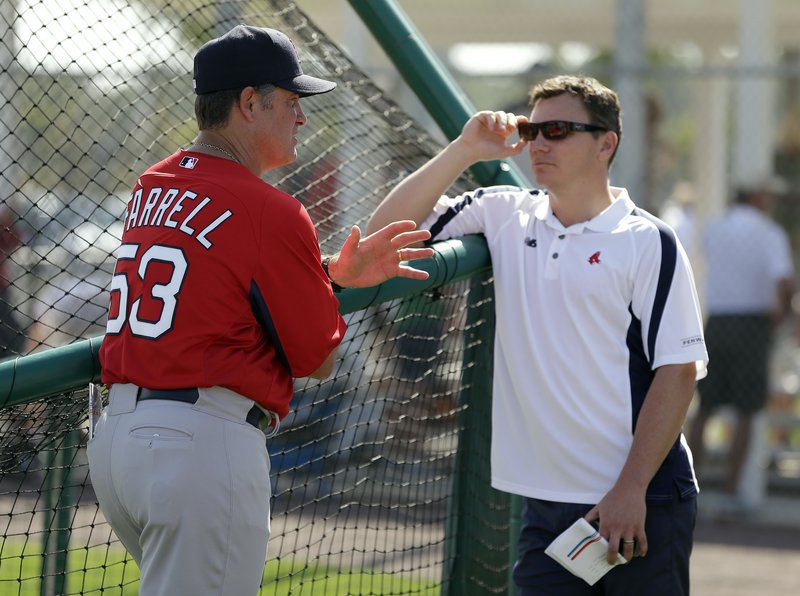FORT MYERS, Fla. – Near the end of another long day and night at JetBlue Park, spring home for the Boston Red Sox, General Manager Ben Cherington walked about energetically.
Now Cherington, 38, who replaced the revered Theo Epstein last year, is a man who keeps himself in shape. But there seemed more to his step than just vitality.
It was hope.
“We’ve had a good spring training,” Cherington said earlier, sitting in the Red Sox dugout while his players took batting practice. “We’ve seen a lot of things the staff wanted to get accomplished. That’s encouraging.”
Encouragement. New England baseball fans need that. They crave a baseball season far from the disastrous one they witnessed in 2012. Boston finished 69-93 last year, the worst Red Sox record since 1965 (62-100).
Red Sox officials use phrases like “turning the page.” Players speak of a “re-set.” But fixing this team required more than tapping a computer key.
“There’s been a lot of changes,” said new manager John Farrell, a significant part of the remodeling process. “As many as nine new players will break camp. We have an entirely new coaching staff.”
The Red Sox need more than new faces. They need an old attitude, one that arrived when a boyish-looking Epstein became the boss before the 2003 season.
“We’re going to turn the Red Sox into a scouting (and) player development machine,” Epstein said at the time.
Even though Boston has more financial might than most smaller-market teams, Epstein said the key to continued success was not expensive long-term contracts to big-name players, but producing a legion of youthful talent.
And, sure enough, the Red Sox developed young, impact players. They ascended in the minor league system, eventually playing for the Portland Sea Dogs at Hadlock Field, on their way to Boston and Fenway Park.
Players like Kevin Youkilis, Jonathan Papelbon, Jon Lester, Dustin Pedroia and Jacoby Ellsbury made an impact with the Red Sox. Youkilis won two World Series rings with Boston in 2004 and 2007. The other four played key roles in the 2007 championship.
In 2008, the Red Sox came within one game of returning to the World Series.
They have not won a playoff game since.
LOSING THEIR WAY?
The Red Sox focus on development changed. Their pipeline of talent had dried up — or was traded away — and Boston became desperate. Epstein shunned his previous philosophy and committed big money for several years to players whose contributions turned out to be less than advertised.
After the Red Sox collapsed at the end of the 2011 season, going from first place to out of playoff contention in a month, popular manager Terry Francona was fired.
But Francona was not the problem. That became evident when Boston ownership hired the bombastic Bobby Valentine to manage in 2012. The team only got worse.
The real change came last Aug. 25. Cherington, a Red Sox employee since 1999, and an assistant under Epstein, traded away three high-priced All-Star players to the Los Angeles Dodgers for a handful of lesser players, including two minor league pitching prospects.
“We recognized that we are not who we want to be right now,” Cherington said at the time. “We felt like in order to be the team that we wanted to be on the field, we needed to make more than cosmetic changes.”
Gone were first baseman Adrian Gonzalez (and his seven-year, $154-million contract), outfielder Carl Crawford (seven years, $142 million) and pitcher Josh Beckett (four years, $68 million).
Almost all the big contracts were gone. Outfielder J.D. Drew (five years, $70 million) retired after the 2011 season. And disappointing Japanese pitcher Daisuke Matsuzaka, who cost the Red Sox $103 million over six years, was in the last year of his contract in 2012.
Only pitcher John Lackey, who signed a five-year deal ($82.5 million) in 2010, remains as an example of Boston’s lavish spending with little results.
While Cherington was cleaning house — without yet providing adequate replacements — the Red Sox were in a free fall on the field. They kept losing. Sports Illustrated put a photo of Valentine on the cover of a September issue, with the caption: “Have the Red Sox Lost Their Way?”
BUILD FROM WITHIN
Handing players big-money contracts is not a problem in itself. The champion Red Sox of 2004 and 2007 featured some well-paid big names like outfielder Manny Ramirez and pitcher Curt Schilling.
But relying too much on big-money names and not developing players from your own minor league system is a risky business. There is no stability, and the gamble is great when the checkbook keeps opening up.
Mike Hazen, like Cherington before him, used to be in charge of the Red Sox minor league system — the “farm director,” in baseball terms. Hazen made frequent visits to Hadlock Field. Now an assistant general manager, first to Epstein and now to Cherington, Hazen watched too few prospects being developed for the majors leagues in recent years.
When Farrell was hired last October, Hazen was optimistic. Not only was Farrell once a Red Sox pitching coach, he also served as a farm director for the Cleveland Indians.
“John’s the right man to be the manager of the Red Sox,” Hazen said at the time of Farrell’s hiring. “In order for this to turn around, there are a lot of tough questions that need to be asked, by the manager and down the line.
“Questioning everything. Roster decisions to the contributions of the farm system, or lack thereof.”
Boston got one contribution last year. Will Middlebrooks, who began to emerge as a promising minor league third baseman in 2011 while playing for the Sea Dogs, was called up last year to replace an injured Youkilis. He was a productive player right away and became a starter. Youkilis was eventually traded.
Hazen said there are more good players on the way. Hadlock fans saw some of them last year, in the faces of outfielders Jackie Bradley Jr. and Bryce Brentz, shortstop Xander Bogaerts and pitcher Chris Hernandez.
“There’s a feel for the development for the player — for us getting back to where we want to get to,” Hazen said. “The supplementation of the roster with key internal guys is critical.”
CONTENDING AGAIN?
While the Red Sox wait for their young players to be ready, they have supplemented the roster with role players on short contracts.
Outfielder Shane Victorino has the longest deal (three years, $39 million). Pitcher Ryan Dempster ($26.5 million) and outfielder Jonny Gomes ($10 million) signed on for two years. Shortstop Stephen Drew ($9.5 million), first baseman Mike Napoli ($5 million) and reliever Koji Uehara ($4.25 million) are on one-year contracts.
Add them to a core of players like Lester, Pedroia and Ellsbury, and the Red Sox are hoping to contend again — now and in the future.
“We all know that every year in Boston is pretty important,” Cherington said. “We feel good and are very focused on the guys who are here.”
Farrell, the man given the charge to lead these guys, doesn’t believe the Red Sox were ever in shambles, despite last year’s record.
“I don’t know you can say a franchise lost its way,” Farrell said. “Certain decisions didn’t pan out. Certain players didn’t embrace or meet the expectations and challenge that Boston and our fan base expect. To say the rudder fell off, I wouldn’t go that far.”
Regardless, whether they were lost or simply losing, the Red Sox can show that they found their way when the season begins in eight days.
“A lot has changed, but that doesn’t change the overall expectation, to compete and contend,” Farrell said, “with every intent to play into October and hopefully deep into October.”
Staff Writer Kevin Thomas can be reached at 791-6411 or:
kthomas@pressherald.com
Twitter: ClearTheBases
Send questions/comments to the editors.






Success. Please wait for the page to reload. If the page does not reload within 5 seconds, please refresh the page.
Enter your email and password to access comments.
Hi, to comment on stories you must . This profile is in addition to your subscription and website login.
Already have a commenting profile? .
Invalid username/password.
Please check your email to confirm and complete your registration.
Only subscribers are eligible to post comments. Please subscribe or login first for digital access. Here’s why.
Use the form below to reset your password. When you've submitted your account email, we will send an email with a reset code.